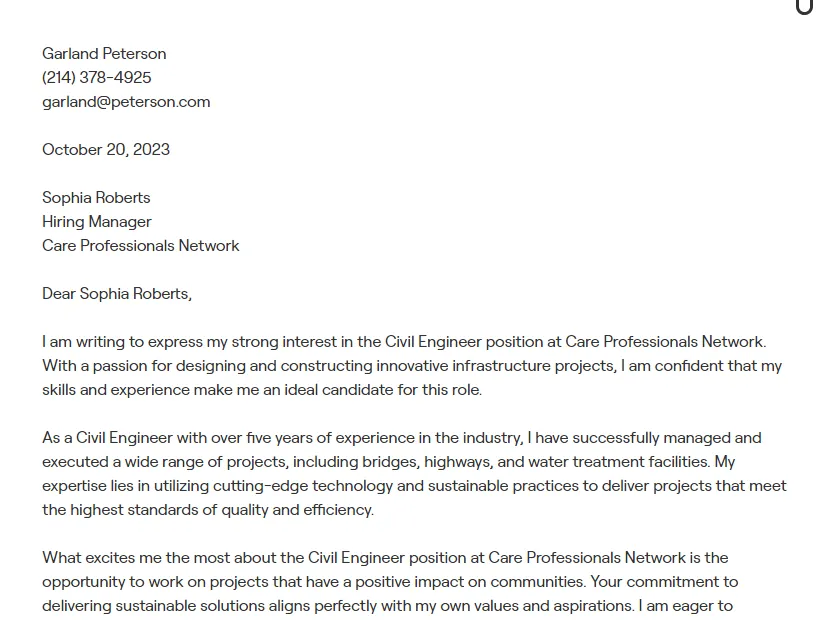What is a Civil Engineering Cover Letter
A civil engineering cover letter is a crucial document that accompanies your resume when applying for civil engineering positions. It serves as an introduction to your skills, experience, and personality, providing potential employers with a comprehensive view of your qualifications. Unlike a resume, which presents a factual summary of your career, a cover letter allows you to express your interest in the specific role and company, explain why you are a good fit, and highlight your relevant achievements in more detail. It’s your opportunity to make a strong first impression and demonstrate your enthusiasm for the opportunity.
Why is a Cover Letter Important
A well-crafted cover letter is essential because it provides context to your resume. It allows you to connect your skills and experience to the specific requirements of the job, showcasing how you can contribute to the company’s goals. Many employers consider a cover letter a key factor in their initial screening process. A cover letter can set you apart from other candidates by demonstrating your communication skills, attention to detail, and genuine interest in the position and the company. It’s also an ideal place to address any potential gaps in your resume or explain career transitions.
Key Components of a Civil Engineering Cover Letter
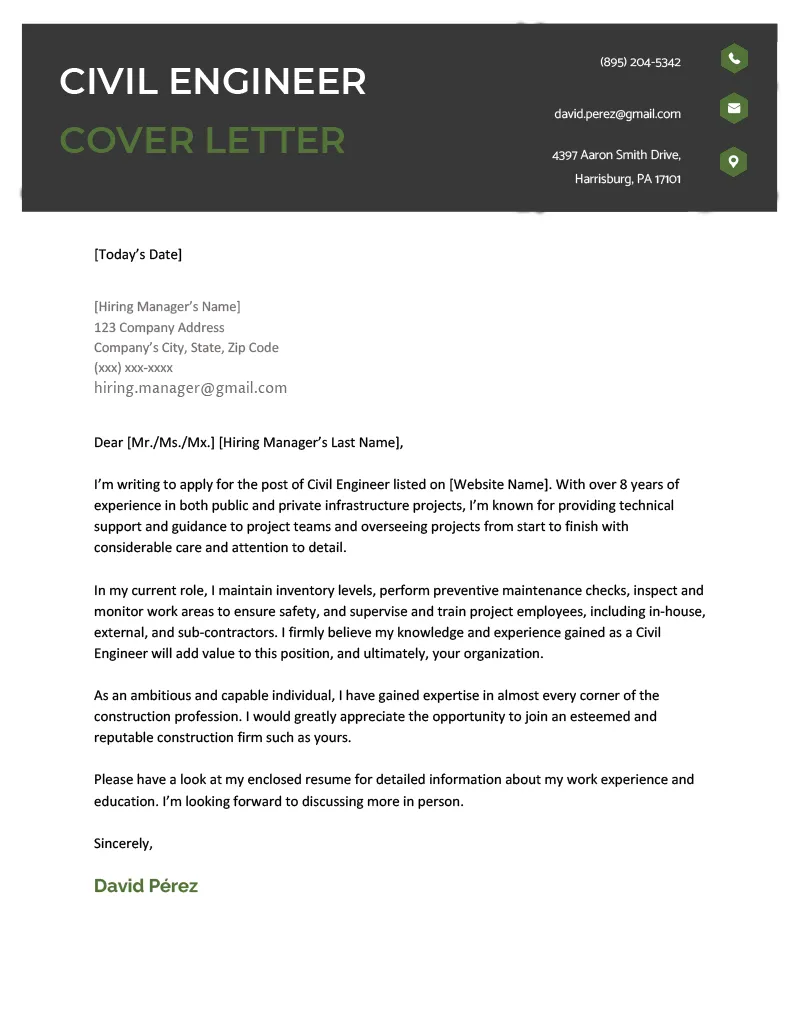
Contact Information
Begin your cover letter with your contact information at the top. Include your full name, phone number, email address, and LinkedIn profile URL (if you have one). You should also include the date and the employer’s contact information (name, title, company, and address) if available. This ensures the employer can easily reach you and shows that you’ve taken the time to personalize your application.
Personalized Greeting
Address your cover letter to a specific person, if possible. Research the hiring manager’s name or the name of the person in charge of the engineering department. Using a personalized greeting, such as “Dear Mr. Smith,” shows that you’ve put in the effort to learn about the company and are genuinely interested in the position. Avoid generic greetings like “To Whom It May Concern” as they can make your application feel impersonal.
Opening Paragraph
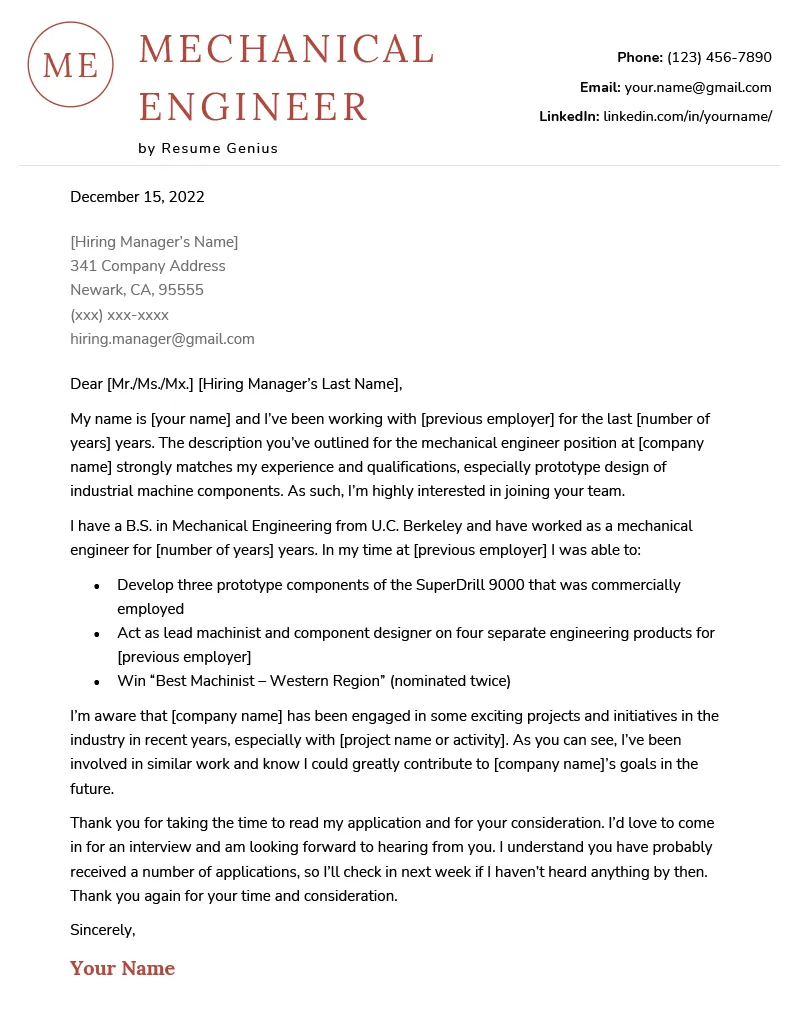
In your opening paragraph, state the position you’re applying for and how you learned about the opportunity. Briefly mention why you’re interested in the role and the company. Express enthusiasm and make a strong, positive first impression. For example, you might say, “I am writing to express my enthusiastic interest in the Civil Engineer position at [Company Name], as advertised on [Platform].”
Body Paragraphs
The body of your cover letter is where you highlight your relevant skills, experience, and achievements. Use 2-3 paragraphs to showcase your qualifications and explain why you are a good fit for the role. Tailor your content to match the job description and emphasize the skills and experience that the employer is seeking. Use action verbs to describe your accomplishments and quantify your results whenever possible.
Highlighting Relevant Skills
Identify the key skills required for the position from the job description. Then, provide specific examples of how you’ve demonstrated those skills in previous roles or projects. For example, if the job requires experience with AutoCAD, describe your proficiency in using this software. Other key skills to highlight include project management, problem-solving, analytical abilities, communication, and teamwork.
Showcasing Project Experience
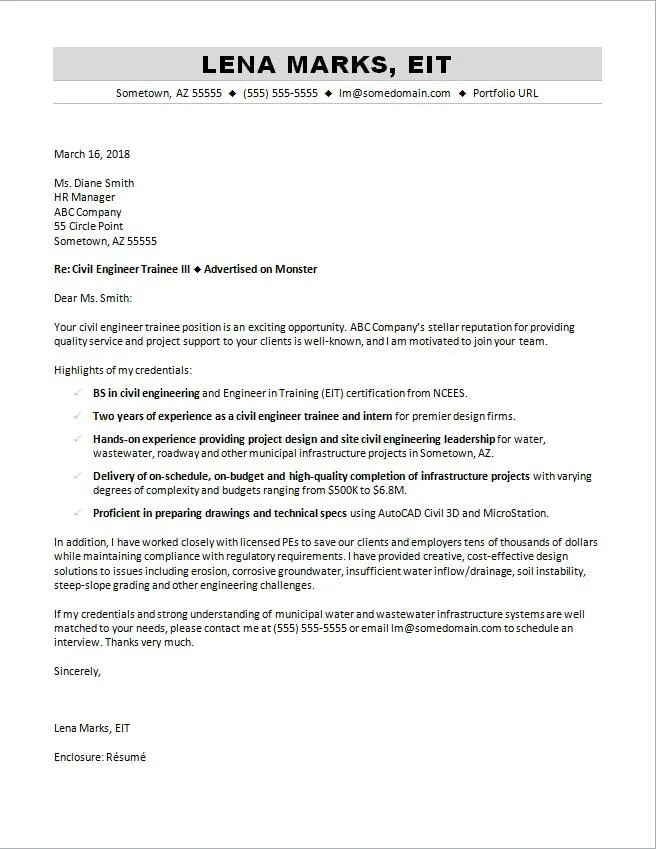
Describe your involvement in relevant civil engineering projects. Detail your responsibilities, the challenges you faced, and the results you achieved. Use the STAR method (Situation, Task, Action, Result) to structure your examples. For instance, describe a project where you managed the design of a road, the challenges you encountered, the actions you took to overcome them, and the successful outcome.
Quantifying Achievements
Whenever possible, quantify your achievements to demonstrate your impact. Use numbers, percentages, and specific data to showcase your accomplishments. For example, “Reduced project costs by 15% by implementing efficient design strategies” or “Successfully completed the project ahead of schedule and under budget.” This approach provides concrete evidence of your abilities and results.
Closing Paragraph
In your closing paragraph, reiterate your interest in the position and the company. Summarize why you’re the ideal candidate and express your enthusiasm for the opportunity. Thank the employer for their time and consideration.
Call to Action
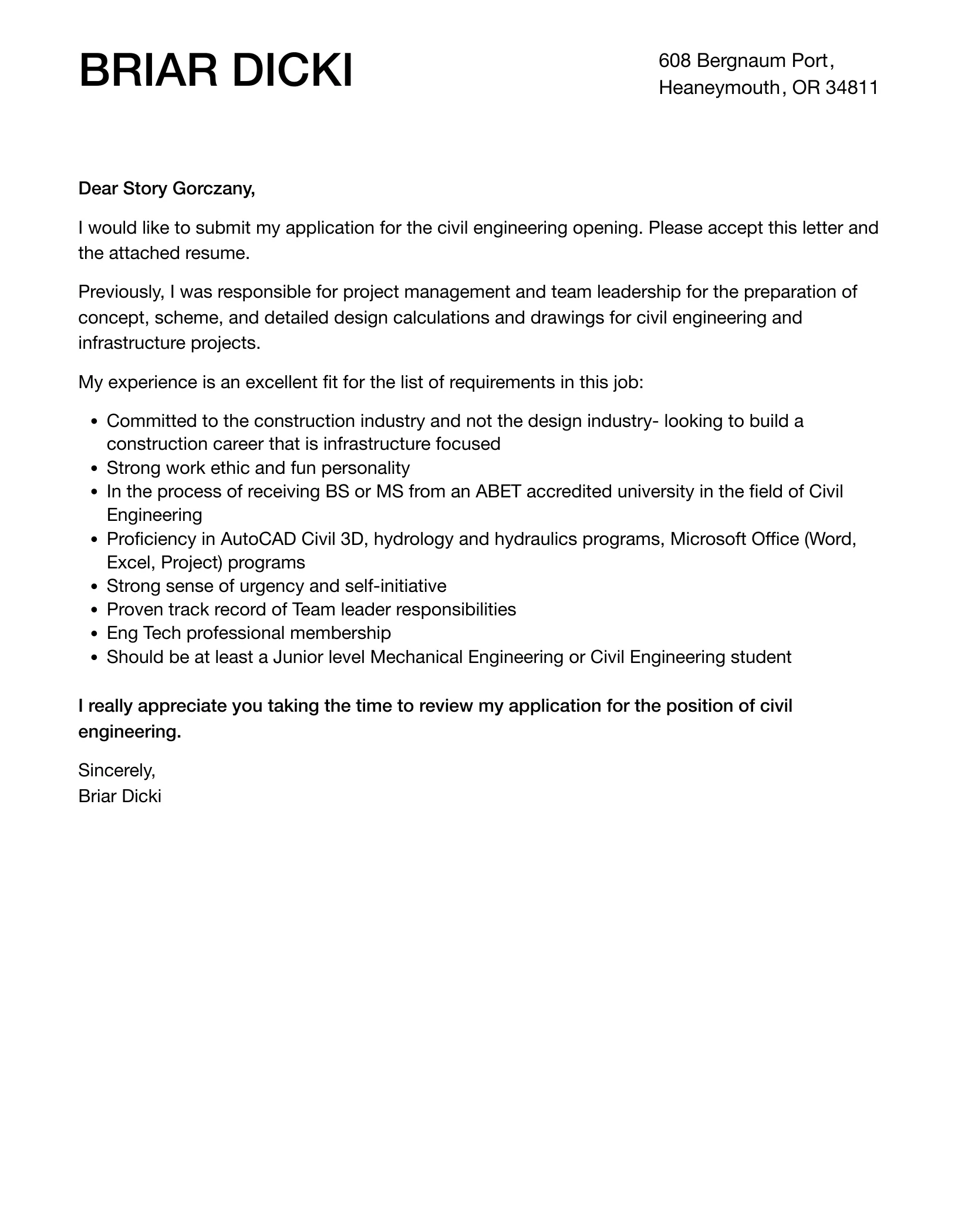
End your cover letter with a clear call to action. Indicate your availability for an interview and provide your contact information once again. State that you look forward to hearing from them soon. For example, “I am eager to discuss my qualifications further in an interview. Thank you for your time and consideration. I can be reached at [Phone Number] or [Email Address].”
Formatting Your Cover Letter
Font Selection and Size
Choose a professional and easy-to-read font, such as Times New Roman, Arial, or Calibri. Use a font size between 10 and 12 points to ensure readability. Consistency in font choice and size throughout the document is important for a polished look. Avoid using overly decorative or unusual fonts that might distract the reader.
Margins and Spacing
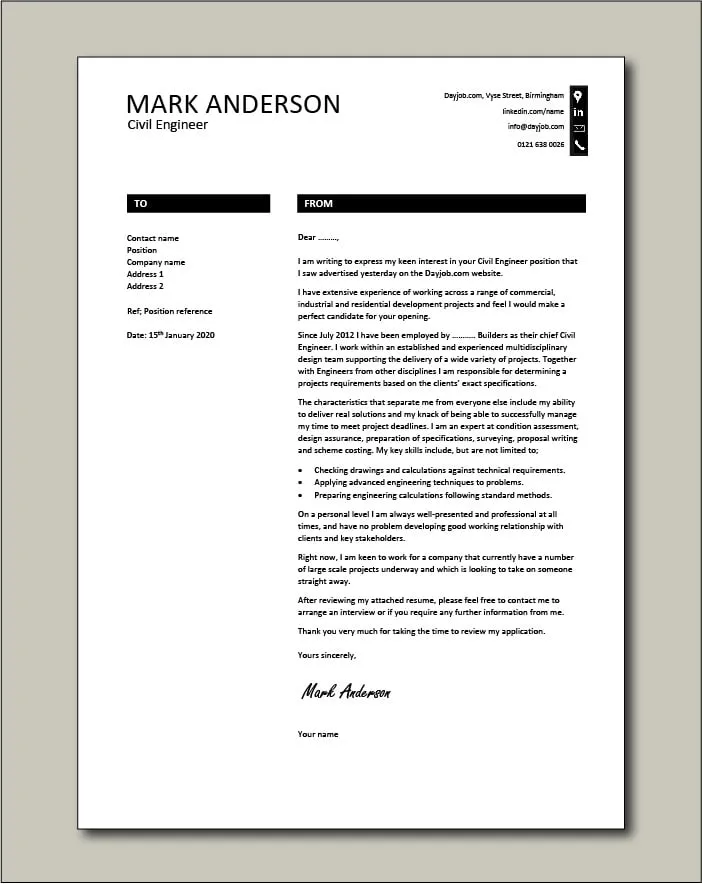
Use standard 1-inch margins on all sides of your cover letter. This creates enough white space to make the document visually appealing and easy to read. Use single-spacing within paragraphs and double-spacing between paragraphs. This helps to separate the sections and enhances readability.
Proofreading and Editing
Proofread your cover letter carefully for any errors in grammar, spelling, and punctuation. Errors can create a negative impression. Ask a friend or colleague to review your cover letter for any mistakes you might have missed. Ensure that the tone and language are professional and appropriate for the job application.
Cover Letter Examples for Civil Engineers
Entry-Level Cover Letter Example
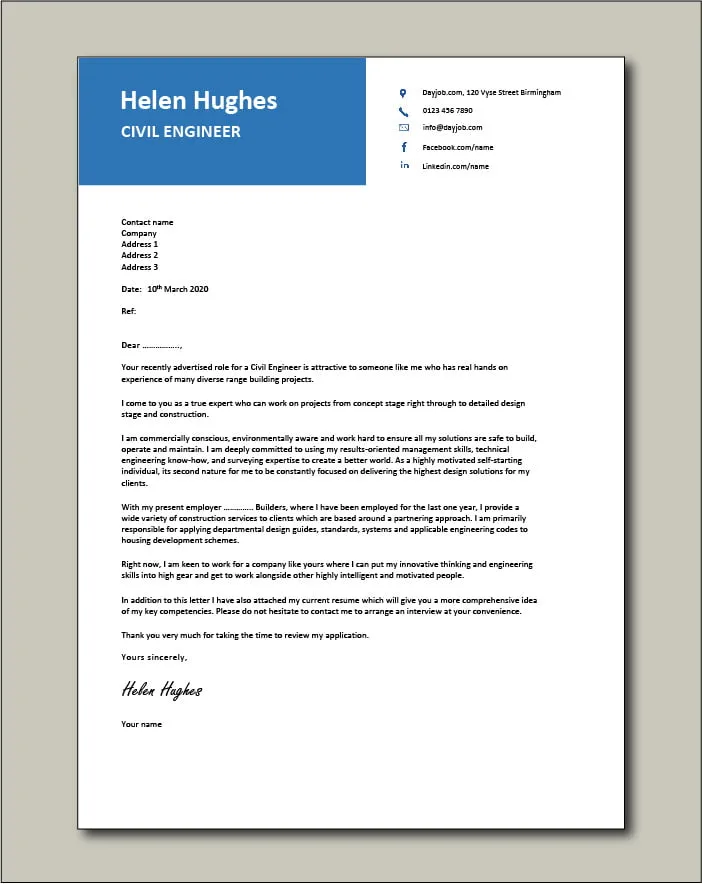
An entry-level cover letter should highlight your education, any relevant internships or projects, and your eagerness to learn and grow in the field. It’s okay if you lack extensive experience; focus on your academic achievements, coursework, and any extracurricular activities that showcase your skills and enthusiasm. Demonstrate your knowledge of civil engineering principles and your passion for the field.
Experienced Civil Engineer Cover Letter Example
An experienced civil engineer’s cover letter should emphasize your professional achievements, skills, and the value you can bring to the company. Include specific examples of successful projects you’ve managed or contributed to, and quantify your results. Highlight your leadership abilities, technical expertise, and your ability to solve complex engineering challenges. Tailor your letter to the specific requirements of the job description and the company’s goals.
Cover Letter Mistakes to Avoid
Generic Cover Letters
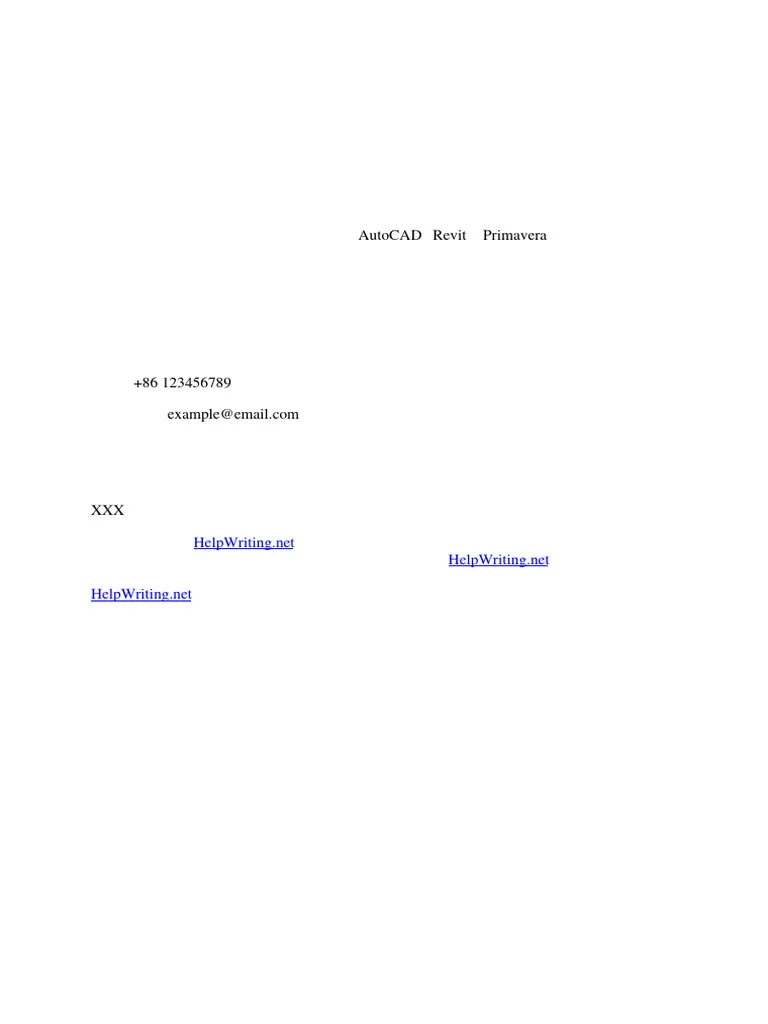
Avoid using a generic cover letter that you send to every job application. Tailor each cover letter to the specific job and company, highlighting the skills and experiences that align with the role’s requirements. Generic letters demonstrate a lack of interest and can reduce your chances of being selected for an interview.
Typos and Grammatical Errors
Carefully proofread your cover letter to eliminate typos and grammatical errors. Mistakes reflect poorly on your attention to detail and professionalism. Use spell-check and grammar-check tools, and have someone else review your cover letter before you submit it.
Ignoring the Job Description
Make sure your cover letter directly addresses the requirements listed in the job description. Tailor your letter to match the skills, experience, and qualifications the employer is seeking. Ignoring the job description makes it difficult for the hiring manager to see how your qualifications match the position.
Tailoring Your Cover Letter
Researching the Company
Before writing your cover letter, research the company and its mission. Understand their values, projects, and recent accomplishments. This information will help you tailor your cover letter to showcase your genuine interest and explain why you want to work for that specific company. Demonstrating your knowledge of the company shows that you have taken the time to prepare your application.
Customizing for Each Application
Customize your cover letter for each job application. Do not use the same cover letter for different positions. Each job has its own unique requirements and expectations. Customizing your cover letter will ensure that you highlight the most relevant skills and experiences for the specific role. This will demonstrate your genuine interest and improve your chances of getting an interview.
